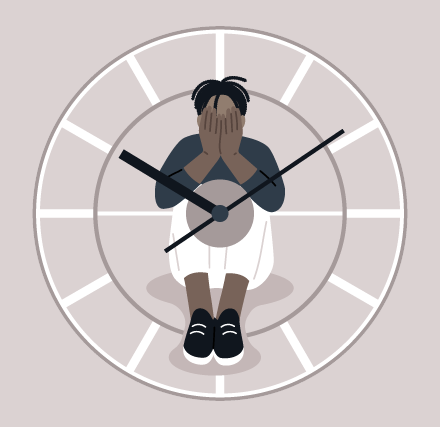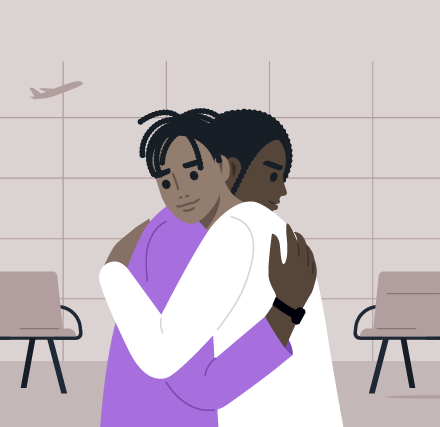Good Grief! Navigating America’s Awkward Dance with Loss Over the Holiday Season
To love deeply means that, inevitably, we will also grieve deeply. Grief is a universal human experience, touching every life at some point in a person’s life. While this natural reaction to loss is profoundly personal—shaped by the circumstances of the loss (sudden, expected, or traumatic death) and the unique dynamics of the relationship, including its closeness, complexities, and unresolved tensions—it is also influenced by cultural norms, values, and rituals. These factors guide how individuals express, process, and find meaning in their grief. During the holiday season, emotions can feel especially intense, making it a particularly poignant time for those mourning the loss of a loved one. As we approach the holiday season, it’s important to acknowledge the unique challenges grief can bring, and to create space for healing and connection during this emotionally charged time.
American grief culture is often characterized by a mix of avoidance, discomfort, and compartmentalization, shaped by societal norms, diverse cultural influences, and the fast-paced nature of modern life. The busyness of the season, with its numerous events, shopping, and social expectations, can overwhelm the grieving person, making it harder to find time or space for processing emotions. During the holidays, these tendencies can become even more pronounced as the season’s emphasis on joy and togetherness contrasts sharply with the isolating and often unspoken realities of grief. The pressure to appear joyful or to participate in festive traditions can create a disconnect, as those who are grieving may feel like they are moving through the motions while struggling with deep sorrow. Below are the key aspects of American grief culture, highlighting the factors that shape how grief is experienced and expressed:

Grief Avoidance and Discomfort
In many parts of the U.S., grief is often viewed as something to be overcome quickly, reflecting a broader cultural tendency to prioritize positivity and resilience. As a result, people may feel uncomfortable discussing death and loss, often attempting to ease their discomfort by offering platitudes or avoiding mention of the deceased altogether. This well-meaning but often unhelpful approach can leave the grieving person feeling isolated and often stems from others’ own fear of mortality.

Individualism Over Collectivism
American culture places a high value on individualism, which can extend to grief. There’s often an unspoken expectation to “grieve privately” and to return to normal life as quickly as possible. Public expressions of grief, such as crying or openly mourning, can sometimes be viewed as weakness, further discouraging people from fully processing their emotions.

Structured Rituals, Yet Limited Time
Traditional rituals such as funerals or memorial services play a significant role in mourning, but they are often brief. Employers typically provide only a few days of bereavement leave, emphasizing a quick return to productivity. This contrasts with other cultures that may observe weeks or even months of mourning rituals.

Grief Illiteracy
Many Americans lack the language and tools to engage with grief, leading to what is often called “grief illiteracy.” This can result in silence or avoidance, even among close friends or family members of the bereaved. People may fear upsetting the grieving person and, as a result, tiptoe around the loss, which only adds to their discomfort. Additionally, misconceptions about the grieving process—such as expecting it to follow a linear path or have a clear endpoint—are common.

Varied Rituals and Practices
The U.S. is highly diverse, and grief practices vary widely across cultural and religious groups. For example, African American communities often focus on collective mourning and celebrations of life, creating space for shared grief and remembrance. Latino communities may incorporate spiritual traditions, such as Día de los Muertos, to honor the deceased and maintain a connection with them. Some Indigenous traditions emphasize the cyclical nature of life, fostering ongoing spiritual relationships with ancestors. These practices often contrast with the more secular or individualistic approaches seen in the dominant culture, where grief is typically handled in a more private and personal manner. Without ritual and a way to honor the dead, grief can feel like being lost at sea, lacking direction and meaning.

Medicalization of Grief
There’s a growing trend to view prolonged grief through a clinical lens, particularly with the recent classification of Prolonged Grief Disorder in the DSM-5. While this acknowledges the profound impact of grief, it may also pathologize what could be seen as a normal response to loss.

Shifting Conversations
In recent years, there has been a growing movement to create more space for grief in American culture. Advocates for death positivity, increased mental health support, and open discussions about loss are helping shift perspectives. Books, podcasts, and public figures are playing a crucial role in normalizing grief as a lifelong process, rather than something to simply “get over.” While American grief culture has traditionally emphasized resilience and moving forward, it is slowly evolving toward a more inclusive and compassionate understanding of mourning. By balancing individual needs with communal support, there is potential to redefine how Americans approach loss.
In an effort to become a more grief-literate culture, it’s important to recognize that during the holidays, the absence of a loved one can feel especially profound. While the season often emphasizes togetherness, celebration, and tradition, it can also be a time to reflect, honor, and find meaning in the love that endures even after loss. By leaning into compassionate understanding—both for ourselves and others—we can create a space for grief that acknowledges its complexity while fostering connection and healing.
Navigating the Holidays After Losing a Loved One
Navigating the holidays after losing a loved one can be an emotionally challenging experience, especially in American culture, where there is a strong emphasis on happiness, celebration, and moving forward. The societal pressure to appear joyful and embrace festive traditions can create a disconnect, making grief feel isolating and often unacknowledged. However, there are several ways to cope with the season while honoring both the grief and the memory of the deceased:
1. Acknowledge Your Grief
- It’s important to recognize that it’s okay to feel sadness, anger, or even numbness during the holidays. Allow yourself time and space to experience and express your emotions without judgment.
- Consider journaling or talking to someone you trust about your feelings, helping to process grief in a healthy way.
2. Create New Traditions or Modify Old Ones
- If familiar traditions feel too painful, consider creating new ones that align with your current needs. This could be as simple as lighting a candle in remembrance or spending the day volunteering in honor of your loved one.
- If you still want to keep certain traditions, it’s okay to modify them. For example, adjusting the format of a family gathering or meal can make it easier to navigate.
3. Set Boundaries
- It’s important to set boundaries with family, friends, or social obligations. If you’re not ready to participate in certain activities, it’s okay to decline invitations or leave early.
- Give yourself permission to step back from events that may feel overwhelming and focus on self-care.
4. Honor the Memory of Your Loved One
- Find meaningful ways to remember the deceased. You could create a memory box, make a photo album, or take part in a ritual that reflects the relationship you shared.
- Sharing stories about the person or including their favorite items or traditions in the holiday celebrations can help keep their memory alive.
5. Create an Emotional First Aid Kit Using the 5 Senses
The holiday season can be overwhelming, so it’s important to have tools to help soothe and ground yourself when grief feels intense. Create an emotional first aid kit using your five senses to provide comfort and calm during difficult moments.
- Sight: Keep a few comforting photos, candles, or meaningful items that remind you of your loved one, or simply bring you peace.
- Sound: Create a playlist of soothing or comforting music, including songs that remind you of your loved one, or choose calming sounds like nature or instrumental music.
- Smell: Aromatherapy can be a powerful tool—lavender, sandalwood, or other calming scents can help ease anxiety and promote relaxation.
- Taste: Comfort foods or favorite treats can provide a sense of connection and warmth. Consider making a special meal or snack that brings you comfort.
- Touch: Keep a soft blanket, a stress ball, or any tactile objects that help you feel grounded. Even a favorite sweater or a cozy scarf can provide a comforting sensory experience.
By using your five senses as an emotional first aid kit, you can have small, accessible ways to care for yourself when the holidays feel overwhelming.
6. Seek Support
- Surround yourself with understanding friends and family, or seek out support groups where you can share your experiences with others who are also grieving.
- Consider professional counseling or therapy if the grief becomes too heavy to carry alone.
7. Honor Your Own Needs
- Be mindful of what you need emotionally and physically. If the holidays feel like too much, it’s okay to scale back, limit activities, or even skip them altogether if that’s what feels best. Each new moment can bring a myriad of emotions. Check-in with yourself frequently on you can best navigate how you are feeling.
- Trust your intuition—grief doesn’t have a set timeline, and honoring your personal process is crucial for healing.
8. Give Yourself Grace
- Allow yourself to feel however you feel without guilt. There may be moments of joy, along with sadness or anger. It’s important to give yourself grace to experience both in the same space.
- Understand that healing is not linear, and some days will be harder than others.
9. Make a Plan
- Another helpful approach is to make a plan for special holidays to give your brain structure and guidance during emotionally charged times. This might include scheduling specific activities, such as taking a quiet walk, watching a comforting movie, or setting aside time to reflect and honor your loved one. Having a plan in place can help reduce uncertainty and provide emotional support, making the day feel more manageable.
- Sometimes, we work so hard to hold it together during the holiday or a significant event that, afterward, we may need extra time to rest and heal. It’s important to acknowledge that emotional energy is drained during such moments, and the aftermath can leave you feeling physically and mentally exhausted. Build in some “recovery time” after the event—whether it’s taking a day off, spending time in solitude, or engaging in restorative activities like a warm bath or light meditation. This time will allow your body and mind to process the emotions, helping you avoid burnout and regain emotional balance.
How to Support Someone Experiencing Grief During this Season
Supporting someone who is grieving during the holiday season can be challenging, but your presence, understanding, and compassion can make a significant difference. Here are some thoughtful ways to offer support:

Acknowledge Their Grief
One important way to support someone during this time is by making space for their grief—checking in on how they’re doing and how they’re feeling. Avoiding the subject of their loss can make them feel isolated and unsupported. Don’t shy away from mentioning their loved one or their grief, and don’t worry about making them sad—they may already be feeling that way. Instead, create space for whatever emotions they are experiencing by being curious and present with them. A simple “I’m thinking of you” or “I know this time of year is especially hard” can help the grieving person feel seen, heard, and supported.

Offer a Listening Ear
Grieving individuals often need someone who will listen without judgment or offering unsolicited advice. Be there to listen to their feelings, memories, and struggles, allowing them to share as much or as little as they wish. Avoid trying to “fix” their grief—just listen with empathy.

Respect Their Boundaries
Understand that grief affects everyone differently, and the grieving person may need space or may prefer quiet moments alone. Respect their boundaries and don’t pressure them to attend social events or engage in holiday activities if they’re not ready. Let them take the lead in deciding what they feel comfortable with.

Offer Practical Help
Grief can be emotionally and physically exhausting, especially during the holidays, when stores are filled with festive reminders of joy and togetherness, making the loss feel even more pronounced. Offering to help with practical tasks can provide much-needed relief during this overwhelming time. You could offer to cook a meal, run errands, or take care of chores like cleaning or grocery shopping. Small gestures like these can make a big difference, allowing the grieving person to focus on processing their emotions without the added pressure of everyday responsibilities.

Include Them Without Pressuring Them
It’s important to let the grieving person know they’re welcome in any holiday gatherings or traditions, but without pressuring them to participate. Avoid cutting them out of celebrations to prevent making them feel excluded or that their grief is a burden. Extend an invitation with the understanding that they may decline, but still offer them the choice. Sometimes, knowing that an invitation is open can be comforting, even if they choose not to attend. This approach shows support without adding pressure, allowing them to engage in a way that feels right for them.

Honor Their Loved One
Do something meaningful to honor their loved one during the holiday season, such as lighting a candle, making a donation to a cause they cared about, or sharing memories. Alternatively, offer them space to create their own rituals to remember their loved one. These acts can provide a sense of connection and help keep their loved one’s memory alive, while also showing your support in a thoughtful and respectful way.

Check In Regularly
Grief doesn’t follow a set timeline, and the holidays may trigger emotions long after the event has passed. Continue to check in with the grieving person in the weeks and months following the holidays. Regular texts, calls, or visits show that you are there for them and that their grief is valid, even when the season is over.

Don’t Take Things Personally
When someone is grieving, it’s important to remember that they may not be their usual selves. They might not respond to texts, engage in conversations, or participate in activities as they normally would. Grief can make it hard to connect or find the energy for everyday interactions. This isn’t a reflection of how they feel about others—it’s a result of the emotional and mental weight they are carrying. Understanding that their absence or withdrawal is part of the grieving process, rather than personal rejection, can help others offer the support and patience needed during such a difficult time.

Be Patient with Their Healing Process
Grief doesn’t have a set timeline, and it’s important to be patient with the person’s healing journey. Allow them to grieve at their own pace, whether it’s a few weeks, months, or even years. There is no “right” way to grieve, and their process may look different than you expect.

Offer Your Presence, Not Just Your Words
Sometimes, just being there is enough. If the grieving person doesn’t want to talk, sit with them quietly, watch a movie, or enjoy a meal together. Your presence can offer comfort in ways that words often cannot. By showing up, offering empathy, and respecting their emotional needs, you can help someone who is grieving feel less alone during this difficult time.
As social beings, our relationships shape and sustain us. Losing someone close can unsettle our world in ways we might not expect. Grief is as much about the absence of connection as it is about the connections that remain—people coming together to honor the deceased and support those who loved them most. The holiday season, with its emphasis on togetherness and celebration, can highlight this loss even more. Yet, in a culture often uncomfortable with the realities of grief, many feel unsure how to navigate their own sorrow or support others in theirs. In these moments, compassion, understanding, and presence can be the greatest gifts we offer one another.
References
Cann, C. (2023). Coping with grief during the holiday season. Baylor University. https://news.web.baylor.edu/news/story/2023/coping-grief-during-holiday-season
Grief and the holidays. (n.d.). CaringInfo. https://www.caringinfo.org/planning/grief-and-loss/grief-and-the-holidays/
Mintz, S. (2024, August 26). A culture of denial. Inside Higher Ed. https://www.insidehighered.com/opinion/blogs/higher-ed-gamma/2024/08/26/how-americans-confront-and-process-death#:~:text=The%20way%20Americans%20grieve%20and,with%20the%20help%20of%20professional
Morgan, T. (2018, December). Are you grieving this holiday season? Here are ways to cope with loss and honor loved ones. American Psychological Association. https://www.apa.org/topics/grief/holiday-season-coping
OpenAI. (2024). ChatGPT (Version 4) [AI language model]. Assisted in generating ideas and editing content for flow for a blog post on the holidays and grieving. Retrieved November 18, 2024, from https://chat.openai.com
The Compassionate Friends. (n.d.). Help For The Holidays. Retrieved from https://www.compassionatefriends.org/help-for-the-holidays/




